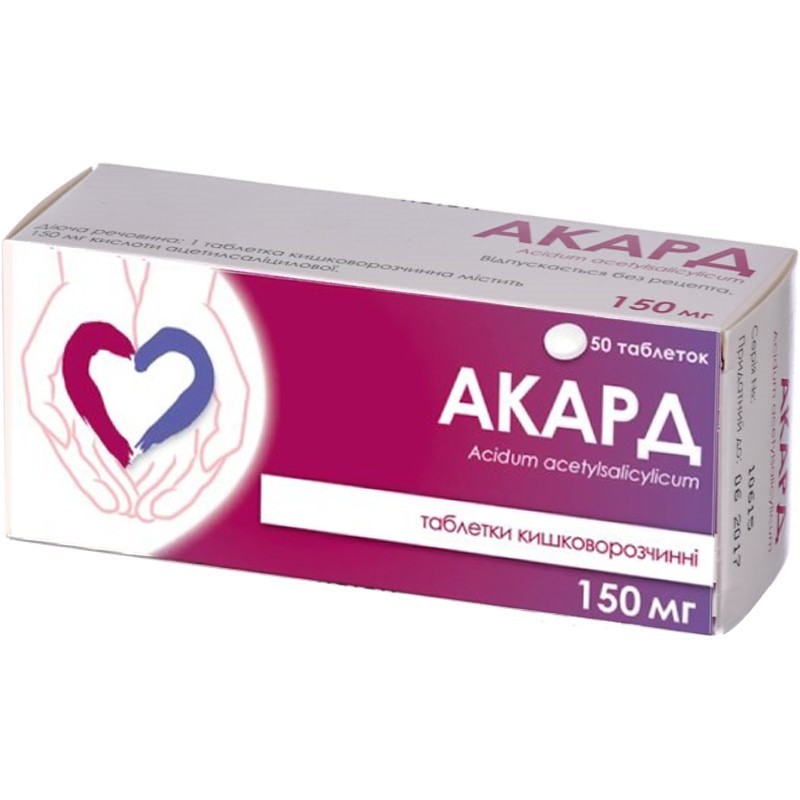



 Secure and encrypted payment processing
Secure and encrypted payment processing We ship to over 40 countries including the USA, UK, Europe, Australia and Japan
We ship to over 40 countries including the USA, UK, Europe, Australia and Japan Guaranteed refund or reship if you haven't received your order
Guaranteed refund or reship if you haven't received your orderAcard tablets are indicated for secondary prevention of stroke.
To reduce risk:
For prevention:
Active substance: acetylsalicylic acid;
1 enteric tablet contains - 150 mg of acetylsalicylic acid;
Excipients: corn starch, powdered cellulose, sodium starch (type A), hypromellose, shell: methacrylate copolymer (type C) talc, titanium dioxide (E 171), triethyl citrate, cochineal red varnish (E 124) silicon dioxide colloidal sodium bicarbonate; sodium lauryl sulfate.
Adults are usually prescribed 1-2 tablets of 75 mg or 1 tablet of 150 mg per day during or after meals. The tablets should be swallowed whole with a little water.
With a recent myocardial infarction or for patients with suspected myocardial infarction: initial saturating dose of 225-300 mg of acetylsalicylic acid 1 time per day in order to achieve rapid suppression of platelet aggregation. A dosage of 300 mg per day can be used for a short time according to therapeutic indications.
Chewable tablets for faster absorption.
Suppression of prostaglandin synthesis may adversely affect pregnancy and / or fetal / intrauterine development. Available epidemiological studies indicate a risk of miscarriage and fetal malformations after the use of prostaglandin synthesis inhibitors in early pregnancy. The risk increases depending on the increase in dose and duration of therapy. According to available data, the relationship between the intake of acetylsalicylic acid and an increased risk of miscarriage is not confirmed ..
During the I and II trimester of pregnancy, preparations containing acetylsalicylic acid should not be prescribed without a clear clinical need. Women may probably be pregnant or during the first and second trimester of pregnancy, the dose of drugs containing acetylsalicylic acid should be as low as possible, and the duration of treatment should be as short as possible.
In the III trimester of pregnancy, all prostaglandin synthesis inhibitors can affect the fetus as follows:
Prostaglandin synthesis inhibitors can affect a woman and a child at the end of pregnancy as follows:
Despite this, acetylsalicylic acid is contraindicated in the third trimester of pregnancy.
Salicylates and their metabolites pass into breast milk in small amounts.
Since no harmful effects of the drug on the child were detected after taking by women during lactation, it is usually not necessary to interrupt breast-feeding. However, in cases of regular use or when using high doses of breastfeeding, it is necessary to discontinue in the early stages.
Do not use drugs containing acetylsalicylic acid for children with acute respiratory viral infection (ARVI), which is accompanied or not accompanied by an increase in body temperature. For some viral diseases, especially influenza A, influenza B and chickenpox, there is a risk of developing Reyes syndrome, which is a very rare but life-threatening disease that requires urgent medical attention. The risk may be increased if acetylsalicylic acid is used as a concomitant drug, but a causal relationship has not been proven in this case. If these conditions are accompanied by prolonged vomiting, this may be a sign of Reyes syndrome.
Given the above reasons, children under 16 years of age are contraindicated in the use of the drug without special indications (Kawasaki disease).
Does not affect the ability to drive and operate machinery.
An overdose of salicylates is possible due to chronic intoxication resulting from prolonged therapy (the use of more than 100 mg / kg / day for more than 2 days can cause toxic effects), as well as due to acute intoxication, which is life threatening (overdose), and the reasons for which may be, for example accidental use by children or unforeseen overdose.
Chronic salicylate poisoning can be hidden, because its signs and symptoms are nonspecific. Moderate chronic intoxication caused by salicylates, or salicylism occurs, as a rule, only after repeated doses of large doses.
The first symptoms of intoxication with acetylsalicylic acid are dizziness, nausea, vomiting, tinnitus and rapid breathing, imbalance.
Gastrointestinal disorders: dyspepsia, epigastric pain and abdominal pain in some cases - inflammation of the gastrointestinal tract, clinical manifestations of erosive and ulcerative lesions of the gastrointestinal tract, which in rare cases can lead to gastrointestinal hemorrhages.
The use of methotrexate in doses of 15 mg / week or more increases the hematological toxicity of methotrexate (decrease in renal clearance of methotrexate with anti-inflammatory agents and displacement of methotrexate with salicylates due to plasma proteins).
With simultaneous use with valproic acid, acetylsalicylic acid displaces it from its connection with plasma proteins, increasing the toxicity of the latter.
Ethyl alcohol contributes to damage to the mucous membrane of the gastrointestinal tract and prolongs bleeding time due to the synergism of acetylsalicylic acid and alcohol.
Systemic glucocorticosteroids (with the exception of hydrocortisone), which are used for replacement therapy for Addisons disease, during treatment with corticosteroids reduce the level of salicylates in the blood and increase the risk of overdose after treatment.
When used with corticosteroids, the risk of developing gastrointestinal bleeding increases.
Selective serotonin reuptake inhibitors: increased risk of bleeding from the upper gastrointestinal tract due to the possibility of a synergistic effect.
Store in a dry, dark place at temperatures below 25 ° C.
Keep out of the reach of children.
Shelf life is 2 years.